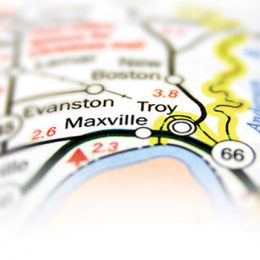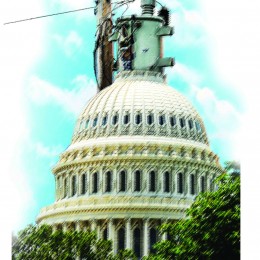 Two years into the Great Depression, New York Gov. Franklin D. Roosevelt announced at the 1931 annual gathering of governors his intention to challenge President Herbert Hoover in the 1932 election. He also first outlined what would become his “New Deal” at this meeting which was held here in Indiana at the French Lick Springs Hotel.Four years later, President Roosevelt’s administration created the Rural Electrification Administration as part of this New Deal. The REA’s goal was to help bring electricity to the 90 percent of rural America that, at the time, had none.
Two years into the Great Depression, New York Gov. Franklin D. Roosevelt announced at the 1931 annual gathering of governors his intention to challenge President Herbert Hoover in the 1932 election. He also first outlined what would become his “New Deal” at this meeting which was held here in Indiana at the French Lick Springs Hotel.Four years later, President Roosevelt’s administration created the Rural Electrification Administration as part of this New Deal. The REA’s goal was to help bring electricity to the 90 percent of rural America that, at the time, had none.
In 1936, Congress passed a bipartisan bill, signed by Roosevelt, that made the REA a permanent federal agency. With the infusion of REA assistance, rural Americans formed their own electric utilities — cooperatives.
As co-ops did what the for-profit electric utilities wouldn’t or couldn’t do — electrify 75 percent of the nation’s landmass in the following years — the most successful public-private partnership in history was created.
Ever since, the reliable and affordable rural electric cooperative power lines used by 42 million Americans, whether we as electric cooperatives and consumers like it or not, have run through Washington, D.C., and statehouses in almost every state.
“We were born in politics, and we’ll die in politics” is an oft-repeated line at electric cooperative gatherings across the nation.
As the years passed, co-ops and the affordable power they provide have been threatened either directly or indirectly at various times by administrations in the White House, regulators and lawmakers from both sides of the political aisle. From attempts to gut the electric co-op loan program, impose unreasonable regulations or pass unfair laws, co-ops have always had to be diligent and muster political might to fight whatever could harm our consumers at the end of the line.
Through the years, we have been successful working with elected officials from all sides because they know co-ops — as consumer-owned, not-for-profit utilities — are solely looking out for consumers. And they know co-op consumers are voting constituents, too.
Throughout recent election seasons, it’s interesting to hear political pundits arguing whether “corporations” are “people.” But on the heals of “Cooperative Month” each October, those who truly know and understand cooperatives know co-ops are indeed people — because people are the co-ops. Not only are co-ops owned by the same people who receive their electricity from that co-op, each co-op board room is democratically controlled at the local level by those very same members.
Each member has an equal say — one consumer, one vote — whether that member uses 1,000 kilowatt-hours per month, or 100,000.
With all this in mind, electric co-ops do not take lightly this, or any year’s, election season. We, as co-ops, do not take sides on the social issues. But co-ops have always taken sides, and will continue to do so, when the reliable, affordable electricity our consumers depend on is challenged. It’s the pocket-book issues that affect the electricity consumers use 24/7 that concern us. We will fight for what’s in the best interest of consumers. That’s what consumers have instructed us, as co-op leaders, to do through their participation at annual meetings and in board rooms.
And, just as Electric Consumer helps readers make smart choices about electrical safety and use, it’s important for the newspaper — the voice of Indiana’s electric co-ops — to serve as a guide for what we think is important to co-op member/consumers in this election. For voters who keep score and an open mind on all the issues, we offer our input on the candidates who, in the most recent past, have best supported co-op interests and who say they will continue supporting our goal of supplying low-cost, reliable electricity to you.
We simply ask that you weigh our recommendations on these energy issues with the other economic, personal, social and party platform criteria important to you and your family. Then, make your choices with care. However you decide, please make your choices count on Nov. 6.



